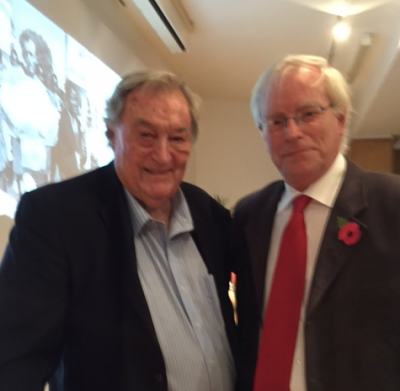|

Last evening we attended Richard’s presentation at the Royal Africa Society called “Kenya’s Wildlife - Predictions for the next decade”.
Between his talk and follow-up questions, he had this to say:
1. He said again that he did not want the job of KWS Chairman, and according to him that it took much time in discussions with President Kenyatta to convince him. Of course, this is completely opposite from a number of previous television and media interviews. In those, Richard said “if called, I will be happy to serve”.
2. He admitted there were on the order of 800,000 cattle in the Tsavos. He said they could not simply be evicted, and that it needed a “long-term plan and an amicable solution”. In almost the same sentence he made the distinction between herders who had to deal with a seasonal lack of resources outside the park (in which case those herders should not expect to raise that many cattle in our opinion) and those who use trucks to transport cattle to take illegal advantage of the park resources. He admitted park rangers took bribes to allow the cattle to remain and that such “grazing costs” were shared up the line to more senior KWS officials. He also mentioned that herders “could be involved in wildlife poaching” – both for ivory and bushmeat.
3. Leakey called for a better involvement of communities around national parks in wildlife conservation, but that his long-term plan for cattle invasions was to “move out and stay out”.
4. Richard mentioned that less than 200 elephants had been poached this year to date (he did not define what poaching was – many elephants have been killed this year but are not classified as being “poached” because no ivory was taken).
5. He said he aims to establish a $100 million “endowment fund”, transparently administered to allow for secure funding of Kenya’s future wildlife conservation efforts.
6. Leakey mentioned that there will be a new KWS Director General announced within the next two months. He said this man has extraordinary skills in management and corporate administration. Leakey would not disclose a name, even though the person has obviously already been selected.
7. He said that the KWS was still a hopelessly corrupt organization, and said the individuals involved in corrupt activities would be rooted out and rapidly brought to book. He promised there would be no impunity from prosecution.
8. He mentioned that it was difficult to work together with Tanzania on any joint wildlife conservation programmes because of an “extraordinary level of corruption in that country”. The Kenya High Commissioner, HE Lazarus Amayo, intervened at that point to mention that a “warm and positive” diplomatic relationship existed between Kenya and Tanzania.
9. Leakey then mentioned that the Serengeti Highway should go ahead. He said there would be “no problem” to construct an “elevated, six lane highway” across certain areas of the Serengeti and mentioned that such a highway could be “quite beautiful”. Leakey did not seem to consider that costs of such a project – a 10-20 meter elevated highway stretching across 30-40 kilometers. In the UK, a similar proposed elevated highway was estimated to cost £5 billion to cover not more than 3-4 miles.
10. Richard said in relation to the Nairobi National Park Southern Bypass and the railway line that he “inherited” the situation and tried to make the best of a bad situation. He said he could only negotiate from a very limited scope of options, and that the “elevated” railway line and the “small amounts” of NNP taken away would not make any difference to conservation. He said the contribution to the “endowment” fund would compensate for the land lost.
11. He said that many more of Kenya’s parks would need to be fenced. He did not elaborate except to say that if you don’t like fences “just close your eyes for a few minutes while you enter the gate”.
Overall, it would seem his talk combined rhetoric with some sound ways forward. Will Leakey deliver substance? Despite his frequent politically “incorrect” statements, Leakey is a consummate politician. In his position of KWS Chairman he is only responsible to the President. He always has in his pocket the ability to deny the extent of his influence and the “luxury” of being able to speak his mind on a diversity of issues. Will such changes he suggested come to fruition?
One of his most used phrases during the evening was “it will take time”.
|




